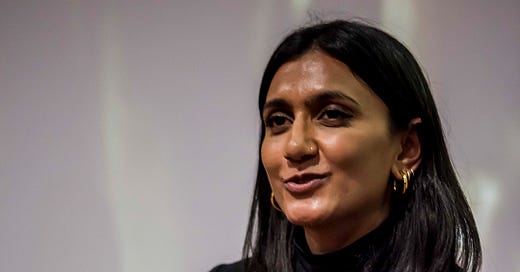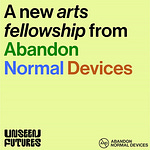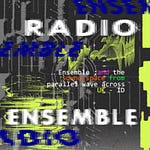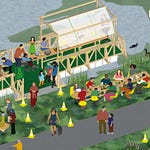Welcome to Episode 16 of the Abandon Normal Devices podcast, ‘Yearning for new ways to make and circulate: towards an infrastructure of being longing’. This podcast is a recording of a keynote given by writer, researcher and producer Jemma Desai, as part of our first-ever New Cinema Days in April 2023.
What happens when we use the phenomenology of yearning to appraise our cultural production infrastructure? Not yearning to belong to what we have, but yearning to be longing: to embody a desire for something else?
Instead of envisaging ‘resilient’ systems that re-form, adapt and shift, might we be able to imagine systems of transmutation that can hospice old ways of being, led by new practices of longing?
What new images might appear? How might they circulate differently? In caring for our longing, what might we no longer accept and what might we fight to care for?
Note from Jemma Desai:
This audio piece is a recording of a performance which took place at New Cinema Days which I called Infrastructures of Yearning. In the live version I spoke over a reel of clips that I had assembled as part of my research.
During this research I was thinking about the invitation to deliver a keynote, and what that meant. I thought about “Keynote” as a sound that might be translated into an image - the first note or the key on which the rest of music plays. If there is a keynote to these images it is one of contradictory desires - yearnings that compete with one another.
I gather here some moments I had come across or been drawn to where images had been made through desire for change, or movement, or attentiveness. I was drawn to both utopic and more sinister longings and so I gathered clips where images had been made of everyday resistance which felt seismic for those who were there when they happened or when grand historical inequities mingled with moments of celebration or spectacle. Moments where a feeling of yearning was distilled into a filmed clip or performance, and moments where yearnings and desires clashed with each other, creating discordance that appeared harmonious due to the ways that it was performed, the ways it was or was not filmed, preserved, presented or written about.
The reel showed clips from: A 2018 news report of a gathering Bollywood actors called Bollywood Shalom where Israeli PM Benjamin Netanyahu recreated the viral 'Oscar selfie'posed with Bollywood superstars as a sign of the 'great friendship' between India and Israel. Ceddo Film and Video Workshop’s The People’s Account (1985) detailing the way that media misrepresentation suppressed, misrepresented and hindered justice for victims of state violence; Little Simz performing Heart on Fire, a song about the artists search for freedom and integrity in capitalist and historically racist structures and industries at the EE BAFTA Film Awards 2023 in front of the Prince and Princess of Wales, the charity’s patrons; actress Shabana Azmi speaking out (to applause and in the presence of the people she directly addressed) at the hypocrisy of the political and artistic establishment at the International Film Festival of India in 1989 shortly after the the murder of a prominent communist playwright Safadr Hashmi; archival footage of Grunswick protestors including Jayaben Desai clashing with the police; the trailer, including press quotes from American and English critics, of Indian director Payal Kapadia’s A Night of Knowing Nothing (2021), a clip of a domestic workers’ union’s demands as recorded in the Yugantar Film Collectives Maid Servant (1981), sections of musings on geopolitics and belonging in Alnoor Dewshi’s Latifah and Himli’s nomadic uncle (1992) and a 1976 performance of Nina Simone singing I Wish I Knew How It Would Feel To Be Free. During the Q&A the reel continued to show footage of the M11 Link Road protests in East London, pre-gentrification Hackney including images of activists and places of community significance in the area which people have tried and failed to have films commissioned about, but which are attended to and recorded in these clips.
The selection of clips, references and images didn’t seek to to flatten difference or force resonances where none exists but to draw attention to points - which are often separated in the division between art and life - where different forces act on each other, contradict one another as well as echo one another. The clips selected display a narrative of yearning - of films made and not made, seen and not seen, stories told and not heard. In the live piece, resonances between the spoken text and the images were not illustrative, but untethered from each other gesturing to possible ruptures and contradictions as well as new connections.
In this audio text this layer of meaning is not present, but you are invited to listen to the piece on headphones in the following ways to create your own layers of meaning.
Listen looking around at the city in which you live. Be sure to take in the sights you see with the full orientation of your neck, not just straight ahead. What do you notice as you turn your attention to your external landscape as you listen? What contradictions, complexities and reconfigurations emerge for you? What do you notice yourself noticing, notice yourself wanting? What do you notice yourself seeing and not seeing?
Turn your attention inward as you listen. What feelings and sensations come up for you while you are listening? For example, did you feel surprise, frustration, or excitement? Did you feel resistance? What kind? How did you hold these in your body? What parts of your body did these sensations settle into? What was the quality of these sensations? Are they cold, breathless, open, nervy or blocked? What other words can you find?
The original piece was written with a postscript, which was not performed on the day.
The original postscript is included here if you wish to read it after you have listened and below is a list of texts that helped me find my way through these ideas.
Bhattacharyya, Gargi. 2022. We, the Heartbroken: Hajar Press.
Bradley, Gracie M., and Luke d. Noronha. 2022. Against Borders: The Case for Abolition. Verso Books.
Chakravorty, Swagato. 2021. ““A workshop focused on issues that mattered”: A Conversation with Retake Film and Video Collective co-founder Ahmed Alauddin Jamal [Video].” Stories From The Block. https://nublockmuseum.blog/2021/02/15/a-workshop-focused-on-issues-that-mattered-a-conversation-with-retake-film-and-video-collective-co-founder-ahmed-alauddin-jamal-video/
Chambers-Letson, Joshua. 2018. After the Party: A Manifesto for Queer of Color Life. NYU Press.
Desai, Jemma. 2022. “Permitted to Dream: Reflections on the Brent Biennial 2022.” ArtReview. https://artreview.com/permitted-to-dream-some-reflections-on-the-brent-biennial-2022
Desai, Jemma. 2023. “Yearning as method - notes on programming.” Substack
Gilroy, Paul. 2023. “Never Again Grenfell.” Serpentine Galleries. https://www.serpentinegalleries.org/art-and-ideas/never-again-grenfell/
hooks, bell. 2015. Yearning: Race, Gender, and Cultural Politics. Routledge.
Hunter, D. 2018. Chav Solidarity. Active Distribution.
James, Joy. 2021. “The Plurality of Abolitionism.” Groundings. https://groundings.simplecast.com/episodes/joy-james
Jones, El. 2022. Abolitionist Intimacies. Fernwood Publishing.
Kumanyika, Chenjerai, and Ruth Wilson Gilmore. 2020. “Intercepted Podcast: Ruth Wilson Gilmore on Abolition.” The Intercept. https://theintercept.com/2020/06/10/ruth-wilson-gilmore-makes-the-case-for-abolition/
Ky Tan, Jack, and Alessandra Cianetti. 2022. “On Work | Interview with Jack Ky Tan.” performingborders. https://performingborders.live/interviews/on-work-interview-with-jack-ky-tan/
Lim, SL. 2023. “No Thanks: How the white art left launders the carceral state.” New Socialist. https://newsocialist.org.uk/no-thanks-how-white-art-left-launders-carceral-state/
Morrison, Toni. 1993. Playing in the dark Knopf Doubleday Publishing Group.
Nilamber, Abhishek. 2018. “S A V V Y • United Screens.” S A V V Y Contemporary. https://savvy-contemporary.com/en/events/2018/united-screens-chapter-1/
Olufemi, Lola, Juliet Jacques, and Jack Ky Tan. 2023. “Structurally F–cked.” a-n The Artists Information Company. https://www.a-n.co.uk/research/structurally-f-cked/
O. Taiwo, Olufe mi (Georgetown U., and Olúfẹmi O. Táíwò. 2022. Elite Capture: How the Powerful Took Over Identity Politics (and Everything Else). Pluto Press.
Parker, Rianna J. 2020. “'The People's Account' of State Violence in Britain.” Frieze. https://www.frieze.com/article/peoples-account-state-violence-britain
Price, Yasmina. 2023. “Mothers and mothering.” Africa Is a Country. https://africasacountry.com/2023/01/mothers-and-mothering
Rodríguez, Dylan, M. McLeod, Angel E. Sanchez, and Patrisse Cullors. 2019. “Abolition as Praxis of Human Being: A Foreword.” Harvard Law Review. https://harvardlawreview.org/print/vol-132/abolition-as-praxis-of-human-being-a-foreword/
Steyerl, Hito. 2009. “In Defense of the Poor Image - Journal #10.” e-flux. https://www.e-flux.com/journal/10/61362/in-defense-of-the-poor-image/












